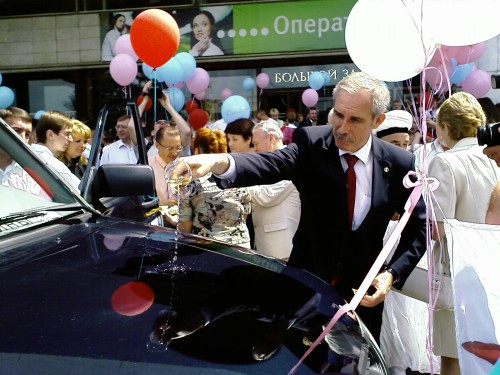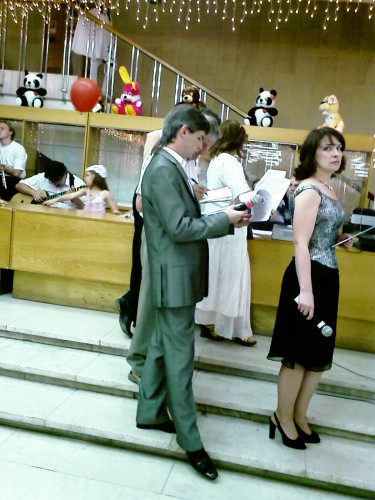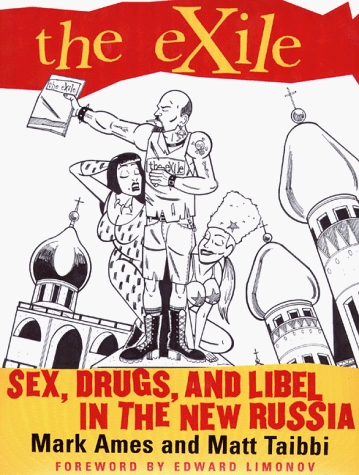
Gov. Sergei Morozov baptizes a UAZ-Patriot, the grand prize for one lucky newborn’s family.
ULYANOVSK, Russia—On a humid Sunday afternoon in late June, about 100 couples clutching newborn babies filed into the Lenin Memorial overlooking the wide banks of the Volga River. This mammoth concrete slab of Soviet constructivism was erected in Lenin’s hometown to commemorate the leader’s 100th birthday and now houses one of the city’s many Lenin museums, but the families had not come for a lesson in Soviet history; they were there to pick up their prizes. The couples were finalists in Give Birth to a Patriot on Russia Day, a local birthrate-boosting competition that offered rewards to anyone who gave birth on June 12, Russia Day.
I was sent to Ulyanovsk by the hip Moscow alt-weekly Bolshoi Gorod to investigate the wackiest of the many schemes thought up by Russian officials to reverse the nation’s population decline in recent years. A few years back, Vladimir Putin declared that women choosing to have a second child would receive 250,000 rubles, nearly $11,000. Since then, a stream of pro-family programs, events, and holidays has been rolled out by the government. The New York Times put a positive spin on this trend earlier this week, but that piece ignored the grim side effects of this crude approach to such a complicated problem.
Give Birth to a Patriot on Russia Day was cooked up three years ago by Ulyanovsk’s governor, Sergei Morozov, to prod the local population into improving the region’s dismal 2-to-1 death-to-birth ratio. It worked like this: Women who gave birth on June 12 would be guaranteed one of a variety of prizes—refrigerators, TV sets, washing machines, even cash, and one lucky family would be picked to win the grand prize: a brand-new Russian-made jeep called the UAZ-Patriot.
To make it easier for couples to participate, Morozov set aside Sept. 12 as a special regional holiday dedicated to family communication, and he urged employers to give their workers a day off so they’d have a better chance at conceiving—and winning!—come Russia Day nine months later. (Never mind that nine months is roughly 39 weeks, one week short of the average gestation period of 40 weeks, so a woman who conceived on Sept. 12 would likely give birth a full week after Russia Day.)
The local media provided blanket coverage. Notices were hung all over town in marriage offices, maternity wards, and stores. Seminars were organized for expectant mothers, and gynecologists and social workers were instructed to make home visits.
“Our governor wants to create interest and excitement about this issue, while at the same time addressing the problems that have been holding the birthrate back,” Anatoly Vasilev, the head of the Department of Social Defense, told me. Vasilev oversees family and social services for the entire region and was charged with handling logistics. To him, it was all about setting up the necessary conditions to make a win possible and then ramping up public interest. After that, the population problem would take care of itself.
“Look at Russian football. Before we started winning in Euro 2008, no one cared about soccer in Russia. Now that we’ve won a couple of games, everyone is a fan,” said Vasilev.
However dubious the premise, it seemed to work out.
On June 12, while Russia enjoyed its day off, doctors all over Ulyanovsk struggled to survive the most hellish day of their professional careers. The region’s maternity wards, which usually stood half-empty, were suddenly filled beyond maximum capacity. Masses of screaming pregnant women seemed to materialize out of thin air. Stressed-out and sleep-deprived doctors ran around frantically attending to patients. Most doctors were forced to work multiple shifts just to keep up with demand.
When the clock finally struck midnight and the last bloody sheet dropped to the ground, the tally was impressive. Eighty-seven children were born in Ulyanovsk that day, nearly four times the region’s average daily birthrate. With just a few prizes, Morozov’s team had found a solution to a problem that has haunted Russia for the last two decades. Or so it seemed.
When I made about a dozen home visits to couples all over the Ulyanovsk region—armed with chocolates and champagne—a disturbing picture of poverty and desperation began to emerge. Every couple I talked with categorically denied that they had planned to give birth on June 12. Despite the media hype, many of the women claimed they had not heard about the event until months into their pregnancies, when their doctors informed them they were eligible. But eventually they revealed that labor was being artificially induced on a massive scale that day, and it had nothing to do with patriotism. Their stories were of women desperate to give birth on June 12 and doctors all too eager to oblige.
One woman recalled seeing a young mother-to-be repeatedly attempt to fake contractions in order to be admitted to the hospital, while some women who were already inside begged their doctors to perform cesarean sections. Another woman recalled thinking that many of the C-sections performed that day were rushed through unnecessarily. A young mother told me that every single one of the 25 women on her floor of the maternity ward gave birth on June 12. That would have been equivalent to the total number of kids born in the entire Ulyanovsk region on a normal day. Another woman told me she overheard doctors talking about prescribing so many labor-inducing drugs that they ran out and had to order a new shipment. There was also a rumor that the hospital that delivered the most babies on June 12 was going to be rewarded by the regional government, possibly with cash. Only one of the women admitted, with much shame and humiliation, that her doctor pressured her to induce labor.
What they told me had all the trappings of a conspiracy. But who was behind the plot? Did the governor’s office pressure doctors to meet a certain quota so that they could brag about the statistics? Or were people so poor that they were desperate to make themselves eligible for prizes?
Whatever it was, the women’s stories seemed to be corroborated by the facts. Official statistics gathered for just one of the city’s neighborhoods showed that the June 12 spike was fed by births from adjacent days: There were two births on June 11, 18 births on June 12, zero on June 13, and two on June 14. The normal rate would have been around four births per day.
Ludmilla Vanina, the head doctor of the neighborhood’s maternity ward, was annoyed at my suggestion and denied that doctors would induce labor just to boost statistics. But after 10 minutes of playing defense on the phone, she slipped up.
“Women want to give birth in June, so they give birth on that day,” she said. “Why? I don’t know. Maybe because they get gifts.”
“You mean to say they gave birth on that day because they got gifts?” I asked.
“We just help women,” she said after a long, uncomfortable pause. “I’m not authorized to discuss this. Plus, I have my own personal opinion of the press,” she said before slamming down the receiver.
“The doctors had nothing to do with it,” said Galya Kaimova, a young mother in her early 20s who works as a police officer. She gave birth on June 14 but was admitted to the hospital two days earlier and had a ringside seat to the chaos of June 12. According to her, many of the mothers who were due around that time induced labor in order to take part in Give Birth to a Patriot.
“Women were asking, practically begging, their doctors to do it,” she said. “They had their babies that day because of the presents; they put their health at risk. It was sick.”
Sick, but understandable. And in retrospect, even predictable.
Ulyanovsk is part of Russia’s Red Belt, a zone of impoverished farming communities and stagnant Soviet factories that stretches west of the Volga River. It has seen little benefit from Russia’s market reforms. Even now, few people can afford the steep prices of the restaurants and the shopping mall that have opened up in recent years. They prefer to spend their free days hanging out on park benches or clustered around their beat-up Soviet-era cars.
Inside the Lenin Memorial on the day of the award ceremony, babushkas raced back and forth setting the tables with wine, blini with caviar, pirogi, bottled water, and juice for the kids. A band performed Russian hits, and women in extravagant ball gowns took to the stage to recite cheesy poetry extolling the virtues of children and family. All the while, beautiful young models in white bridal dresses flanked the perimeter of the hall to lend beauty to the simple provincial faces. By Ulyanovsk standards, it was a swank affair.
The MC worked hard to get his bilan drape just right for the ceremony. After all, the governor would be in attendance.
The governor arrived and mechanically ticked off his administration’s successes—improved welfare packages for needy families with children, new kindergartens and schools were on the way, and so was a new maternity hospital. Finally, he announced the results of the competition. The car keys would go to the only participating family that had given birth to a fourth child; the rest would receive cash prizes of $300—a good month’s wages—that could be spent anywhere.
For many of the mothers, the prize was a godsend, but one they achieved at considerable risk to themselves and their children. Sergei Morozov emerged as the event’s only true winner. He apparently found a solution to what Vladimir Putin calls Russia’s most acute problem. And he did it in a way that avoids the laborious work of tackling the crisis at its root: fixing basic infrastructure, creating jobs, and improving the quality of life.
A version of this article first appeared over at Slate.com You can reach Yasha at levine@exiledonline.com.
Read more: bolshoi gorod, Russia, russian politics, russian travel, ulyanovsk, Yasha Levine, Russia Babylon


Got something to say to us? Then send us a letter.
Want us to stick around? Donate to The eXiled.
Twitter twerps can follow us at twitter.com/exiledonline















